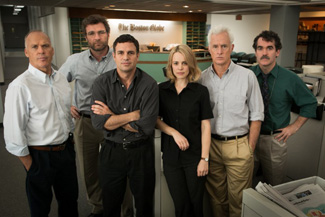Movie Review: Spotlight
By Matthew Huntley
November 30, 2015
BoxOfficeProphets.com

Now comes Spotlight, the sort of Hollywood version of Deliver Us From Evil that chronicles the Boston Globe’s efforts to uncover the Catholic Church’s deliberate cover-up of incidences like Father O’Grady’s, specifically those within the Boston Archdiocese. It’s a completely different narrative compared to Deliver Us From Evil, but both films share the same intention: to bring to light a horrifying truth and scandal that was, sadly, systemic and went on for decades with far-reaching, traumatizing effects. One might say Spotlight makes some of the subject matter of Deliver Us From Evil more accessible to general audiences.
But subject matter aside, and despite it being “based on actual events,” Spotlight is also, at its base, a thoughtful, intelligent and well-made drama. We wish it wasn’t based on real events, but if any film is going to inform us about them, this is an entertaining way to do it, if “entertaining” should even be used in this context.
The film centers on the investigative team known as Spotlight at the Boston Globe, which, in 2001 when the film takes place, only had four staff members: Robby Robinson (Michael Keaton), Michael Rezendes (Mark Ruffalo), Sacha Pfeiffer (Rachel McAdams), and Matt Carroll (Brian d’Arcy James). They’re all nervous because the Globe has just hired a new editor, Marty Baron (Liev Schreiber), who’s Jewish, not from Boston originally, and not really into baseball. These are three preemptive strikes against him because, after all, this is Boston, a prideful town ruled by Roman Catholics and die-hard Red Sox fans (although, to be fair, Baron is trying to get a feel for the city by reading The Curse of the Bambino). But it’s not Baron’s religion or hobbies that make the Spotlight team uneasy; they’re worried he might inflict the same layoffs he did at his former paper in Miami.
So Robby takes Baron seriously when he suggests Spotlight should follow up on an article written by one of their fellow columnists, about a Catholic priest who molested kids in several different parishes. However, Baron stresses that neither the priest nor his victims should be the story. Rather, it should focus on the fact the church knew about it but still didn’t take any action to stop it, instead using its social, religious and financial leverage to cover it up, including hiring lawyers to settle with the victims outside of court in exchange for their silence; listing the accused priests as being on “sick leave” in the Catholic directories (this way, they wouldn’t be found); and ensuring documents that prove the priests’ wrongdoings, such as letters from the victims and their parents, are made unavailable to the public. Baron tells Robby the story is revealing this high-level, intricate “system” the Church has in place and that it’s been in operation for decades, all without its parishioners, or the general public, privy to it.
And so, over the course of the next year, amidst other major news events like 9/11, the Spotlight team works tirelessly to connect all the dots and threads behind this conspiracy, gaining a newfound perspective of just how much power and influence the Catholic Church wields, and not just in Boston, but all over the world.
For the most part, Spotlight unravels like most investigative thrillers and its tactics aren’t anything we haven’t seen before, but this traditional approach by director Tom McCarthy works well because it allows us to pay close attention as events unfold and the characters speak key dialogue. His and Josh Singer’s screenplay finds a good balance of plot and substance and we really come to empathize with the Spotlight team as they research and orchestrate their story. Just as they do, we grow frustrated by all the bureaucratic and logistical hurdles and we recognize the emotional and moral dilemmas the story poses, especially since the investigators are all Catholics themselves.
There’s also a fair amount of tension as pressure mounts on Spotlight to break the story first. These moments are followed by deep, personal reflections as each staff member considers his and her own devoutness and longstanding history with the church. The underlying question they all ask is, why hasn’t anyone done anything about this? (Robby’s transformation is particularly hard-hitting because he learns this story was brought to him years ago but he buried it in the metro section.)
Because Deliver Us From Evil was so compelling and draining, I actually hold it in higher regard than Spotlight. Berg’s film certainly wasn’t pleasant viewing but it was, I feel, essential and I think watching it first will make Spotlight seem like a reward and an earned break from material that’s already hard to accept. But even if I hadn’t seen the documentary prior, I would still recognize the virtues of McCarthy’s narrative. It gives us a real sense of what Spotlight had to do to reveal the truth. The direction is sharp, the storytelling is rhythmic and flows easily, and the performances all hit a genuine note. An added bonus is that one need not watch Spotlight in stages, and although that might not make it as indelible as Deliver Us From Evil, it’s still a film that will have viewers talking about it long after they leave the theater.